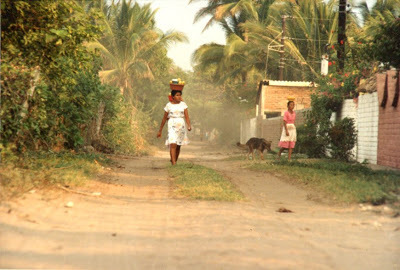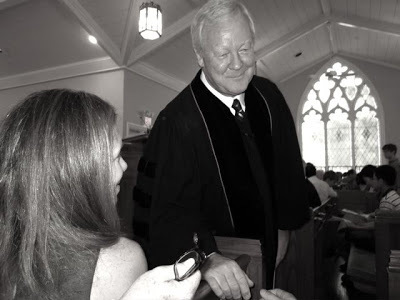Beth Kephart's Blog, page 172
July 30, 2012
sweeping generalizations don't help a soul

I am always surprised—and, indeed, why shouldn't I be?—when I find myself in conversation with anyone making sweeping generalizations about "certain" types of people.
Of course he would do that, the person will say. He's from (name a country).
Of course she would say that. She's... Latina.
I find generalizations of any kind both treacherous and appalling. I have been squeamish around bucketing, categories, labels (applied to people, literature, opinions, persuasions) for as long as I can remember. But it's personal, too, for me, for I married a Salvadoran man, and I have raised a beautiful half-Latin child, and any bracketing, tiering, or typing assigned to "those Latinos" is an assault of sorts against my family.
This image, above, is El Salvador, years ago. It is my husband's childhood home, and it is home, still to Nora, my mother-in-law, and to Bill's aunts Adela, Ana Ruth, and Marta, and to his uncle, and to my husband's best friends, and to a gardener named Tiburcio, and to so many more. Nora's first language isn't English, far from it, but Nora has taken such an interest in my writing life that she has asked three times already for a copy of my newest book, which was only released a week or so ago. It will take her a long time to read it, but she will. She's interested in the stories I tell, even if I'm not "from her country" and was not, perhaps, the kind of woman she first imagined her son saying yes to, and do happen to have skin that is lighter than her own.
We are a web, we are human, we are mutual planet dwellers.
Sweeping generalizations don't help a soul.




Published on July 30, 2012 06:21
July 29, 2012
a final Sunday with the Wilsons

St. John's Presbyterian Church celebrated Reverend Victor Wilson's twenty years with us today—and said goodbye to a family it is impossible not to love as Victor gave his final sermon. Morning and evening were Victor's themes. The responsibility we all have to carry memory forward, not as a burden, but as a gift. The Wilsons will live among mountains now, birds, open air, artists, dulcimer songs. They will visit with their beautiful girls, walk Carolyn's children to school, bless Katherine's upcoming wedding to Sean.
Will you grow old with me? Victor asked Jane, his fabulous red-headed wife, at his sermon's close.
And I thought to myself that that is perhaps the most romantic question a man can ask a wife.
Health and happiness, Victor and Jane.




Published on July 29, 2012 09:59
parenting for authentic success

My friend Judith Warner has reviewed an important-sounding book in today's New York Times Book Review, on a topic forever close to my heart. Titled Teach Your Children Well: Parenting for Authentic Success and authored by Madeline Levine, the book is about teens pushed toward false ideals of success, and the consequences. It's about the teens with whom Levine, a therapist, works—"depleted, angry, and sad as they compete for admission to a handful of big-name colleges" and about the parents "who can't steady or guide them, so lost are they in the pursuit of goals that have drained their lives of pleasure, contentment, and connection." It's about a society that has, in Warner's words, "reached a tipping point, in which the long-dawning awareness that there's something not quite right about our parenting is strengthened into a real desire for change."
The review closes with this paragraph:
After all, as Levine notes, the inconvenient truth remains that not
every child can be shaped and accelerated into Harvard material. But all
kids can have their spirits broken, depression induced and anxiety
stoked by too much stress, too little downtime and too much attention
given to external factors that make them look good to an audience of
appraising eyes but leave them feeling rotten inside.
I read this review at this early hour and my mind returns to George William Shaw, whose funeral earlier this week was deeply moving. Geordie, George's son, spoke eloquently. Describing his father as an extraordinary ordinary man, Geordie went on to list George's greatest achievements: He never put himself first. He was a quiet provider. He made all who knew him comfortable. He made us laugh. He loved his wife and let her know, every single day. He bought his daughter roses every birthday. He taught the neighborhood kids how to pitch. He never missed a sporting or school event when his children, or their friends, were involved. He treated his daughter-in-law like a daughter. He was proud of his roots.
These achievements seemed to me to be of the very highest order. These achievements, in the long run, mattered. Vacationing neighbors chartered a plane back to my neighborhood to attend the funeral of this man. A former neighbor flew in from Steamboat Springs. The friends of George's children came. Every neighbor in these parts stopped whatever they had planned for Thursday and gathered in memory of George. This was because of who George was and not because of George's resume.
George's life is proof of the power of goodness, plain and simple. George's achievements are, perhaps, the kind that we parents can dedicate ourselves to teaching, the kind that Warner and Levine are suggesting we must. The what will come for our teens. The who is long and tender in the making.




Published on July 29, 2012 04:53
July 28, 2012
when I say that I have some gorgeous friends, I am not messing around.

Here are those Wilson girls—Jane, with music in her heart, Katherine, our sensational, happy, smart, loving, and blog fabulous Newlie, and Carolyn, with whom I could stand and talk for hours, and why, oh why, can't we have more hours? We did not pre-color coordinate (those Wilson girls have other things on their minds), but I suspect you won't believe me. But I am proud and lucky to know this family, and to have known them for so long. Every radiant inch of their outsides is equaled by who they are within.
Gorgeousness is also my friend Kelly Simmons (The Bird House, Standing Still), who drove all the way out to Exton, PA, to see me today. I love Kelly, and I love that she surprised me, and I'll never forget us rearranging the mall furniture so that we could pretzel ourselves up and talk books. I only wish I'd thought to take your picture, Simmons.
SIMMONS?! :)
Kelly, thank you.




Published on July 28, 2012 13:46
Bruce Springsteen, Glory Days Symposium, and Thanks

Could there be anything more thrilling (for a reader-rocker) than reading the beautifully researched, impeccably written David Remnick profile of Bruce Springsteen in the July 30 issue of The New Yorker? The story is called "We Are Alive," and most everyone read it before I did, because my issue didn't arrive until late yesterday afternoon. I'd read pieces online. I'd read the raves. But yesterday, after a very long day of corporate work and minor agitations, I found a breeze and read the profile through. I didn't have to fall in love again with Bruce Springsteen; I've been in love since I was a kid. But I loved, loved, loved every word of this story. I would like to frame it.
(For those who haven't seen my Devon Horse Show photos and video of Jessica Springsteen, who is as sensational in her way as Bruce is, I share them here.)
Perhaps my favorite part of Remnick's article was discovering the way that Springsteen reads, how he thinks about books. You don't get to be sixty-two and still magnetic, necessary, pulsingly, yes, alive if you don't know something, and if you don't commit yourself to endless learning. Reading is one of the many ways Springsteen stays so connected to us, and so relevant. From The New Yorker:
Lately, he has been consumed with Russian fiction. "It's compensatory—what you missed the first time around," he said. "I'm sixty-some, and I think, There are a lot of these Russian guys! What's all the fuss about? So I was just curious. That was an incredible book: 'The Brothers Karamazov.' Then I read 'The Gambler.' The social play in the first half was less interesting to me, but the second half, about obsession, was fun. That could speak to me. I was a big John Cheever fan, and so when I got into Chekhov I could see where Cheever was coming from. And I was a big Philip Roth fan, so I got into Saul Bellow, 'Augie March.' These are all new connections for me. It'd be like finding out now that the Stones covered Chuck Berry."
Next week, I'll begin to write my paper for Glory Days: The Bruce Springsteen Symposium, which is being held in mid-September at Monmouth University, and where I'll be joining April Lindner, Ann Michael, Jane Satterfield, and Ned Balbo on a panel called "Sitting Round Here Trying to Write This Book: Bruce Springsteen and Literary Inspiration." I don't know if I've ever been so intimidated, or (at the same time) excited. I don't know what I have in me, if I can write smart and well enough.
But this morning I take my energy, my inspiration, from the friends and good souls who have written over the past few days to tell me about their experience with Small Damages. We writers write a long time, and sometimes our work resonates, and when it does, we are so grateful. When others reach out to us, we don't know what to say. We hope that thank you is enough. And so, this morning, thank you, Jennifer Brown. Thank you, Alyson Hagy and Robb Forman Dew. Thank you, Tamara Smith. Thank you, Elizabeth Ator and Katherine Wilson. Thank you, Jessica Ferro. Thank you, Hilary Hanes. And thank you, Miss Rosella Eleanor LaFevre, who interviewed me a few years ago about Dangerous Neighbors, and who has stayed in touch ever since. I don't even know how to say thank you for her blog magazine thoughts on Small Damages today. I can only suggest that if you read it through, you'll know something important about her heart.
To being inspired. To writing forward. To keeping on with keeping on, with the hope of better work. Always.




Published on July 28, 2012 06:16
July 27, 2012
three facts about tomorrow

1) I will get to Body Combat because I have failed to Zumba all week long, because I have eaten too much, because I have been at this desk pounding, pounding, but even my fingers are fatter than they were.
2) I will see beautiful Katherine at her wedding shower, even though I couldn't resist and bought her something not on the shower list. Katherine, I had to, and I hope you love it. (It's just so you.) I will also see, at this same event, Katherine's beautiful sister, Carolyn, and their mother, Jane, and the next day I will see them all again, at St. John's Presbyterian Church, where we will be honoring Reverend Victor Wilson, standing in our pulpit one last time before retirement. It is a very special weekend. Want to see how special this bride-to-be is? Read her blog Newlie. Find out how to smash some strawberries.
3) I will be driving, mid-shower, lightning speed but hopefully sans lightning, to Books a Million in Exton, PA, where I'll be hanging out between 1:30 and 3:00, should anyone want to stop by and talk about Spain, weather, paella, mysterious boys, Katherine's shower (just kidding, Katherine!), or a novel titled Small Damages. The exact address: 298 Exton Square, Exton, PA 19341. Perhaps I'll see some of you there. Laura Schibinger, Books a Million GM, I have one thing to say to you: Dancing will only make it better. That's how dancing works.




Published on July 27, 2012 15:51
the sweetest Shelf Awareness star for Small Damages

In infinite ways, I am grateful for Jennifer Brown's starred review of Small Damages, which appears today in Shelf Awareness. Jenny writes of wishing the book would, after it ends, begin again. I feel the same way about Jenny's review, which I have read over and then again, humbled.
And for which there are not enough thanks.




Published on July 27, 2012 09:39
Panorama City/Antoine Wilson: Reflections

I encountered Antoine Wilson at the BEA, where I had gone to find out which adult titles had all the buzz, and why, on behalf of Publishing Perspectives. Quick on his feet, witty, Antoine was, nonetheless, the author of a book about a "slow absorber"—a 28 year old named Oppen Porter who is recording every millimeter of minutiae about his life and thoughts for the benefit of his unborn son, whom Oppen doesn't expect to meet, stuck as Oppen is, in a hospital, and perhaps dying. I would need to add a few more commas to that last sentence, a smattering of additional half-steps, not to mention some unexpected profundities, they would have to be funny profundities, but also true, in the way that funny is also true, except that I am personally incapable of conjuring either the profound or the funny, in order to foreshadow the nature of the novel itself, which I have just finished reading, in order to give you a sense for the whole. Or one small sentence of the whole.
I would have to be Antoine Wilson, but I am not. I would have to be a literary ventriloquist with an obsession with the question, What is a man of the world?, but this is Wilson's terrain. His Oppen is a Forrest Gump of sorts (minus the super-hero powers and the awesome historic coincidences)—optimistic, well-meaning, highly observant but also stuck in his observing, capable of seeing a lot of the picture, but perhaps not the same picture that so many of us see (because we are rushing, because we have conformed, because we have ceded something of the raw and unschooled in ourselves). The novel is a monologue, a man talking into a tape recorder while his baby sits coiled within his gold- and white-toothed mom. It is a circle, and while riding the circle, one meets fast-food workers, big thinkers, exasperated aunts (all right, just one single exasperated aunt), religious zealots, and a talking-cure shrink who cures nothing.
I'm going to share here three sentences of Oppen's world. Oppen is tall, you see, and his sleeping arrangements are unfortunate. He's finding himself slightly fatigued:
I'm not a complainer, I wouldn't have said anything, except that I was concerned I wasn't going to be getting enough rest, that over the course of several nights the lack of rest would add up to a general fatigue, it had happened to me before, it had happened to me in Madera, when I had broken my arm, or rather my arm had gotten broken while playing Smear the Queer with the Alvarez brothers, I had fallen in an awkward way, and because of the cast and the way it was situated I could not roll over freely in my sleep, and as a result I suffered from what your grandfather called general fatigue, which he said was quite noticeable with me, what happened was that in addition to having less energy I was less interested in everything and less friendly, too, I wasn't myself. At the time I did not know the root cause of the general fatigue but I have since come to realize that without sleep the head gets clogged with other people's words. The head needs sleep to make everyone else's words into our own words again, it is a conversion process.
One final thing. Panorama City is a Lauren Wein (Houghton Mifflin Harcourt) book. Lauren, whom I am proud to say is a friend, continues to produce some of the most interesting books around. Read Shards, if you can. Read Book of Clouds. Read




Published on July 27, 2012 06:01
July 26, 2012
the day that was: Melissa Firman, George Shaw, Small Damages, Truth

I began a blogging conversation with Melissa Firman of The Betty and Boo Chronicles so long ago that I can't remember the first prompt, the earliest words. Melissa and I share many things—proximity (at least until a transfer took her west), friends, a love for our children, a love for books—and the first time I actually met Melissa was on a bitter cold night, when she came to a talk I was giving about the impact of place on my work. She came bearing books, my own. She has built, over time, an embarrassingly generous Beth Kephart library. Even as she does so many things, for so many others, and even as she keeps her Facebook friends abreast of the special people in her life.
And so Melissa's words today, about Small Damages, are the words of one who has read an oeuvre with great care. They are the words of someone who has carefully, patiently watched my work evolve over time. Reading Melissa's blog post was, to me, akin to reading a scholarly piece. I learned so much and became so absorbed in Melissa's thinking that it wasn't until the end that I remembered that she was writing about me. This post was so exceptional that my publicist, Jessica Shoffel, sent an email earlier: Making sure you saw this one.
I share Melissa's words at the end of a day of many emotions. We honored our George Shaw this morning at a beautiful service in which grandchildren read, a son eloquently remembered, and family and friends and neighbors knit tight. How proud George is, looking down, on his gigantic community. His son referred to George as an extraordinary ordinary man. My own son, sitting near me in the pews, said later that that is the best kind of man.
After the service and lunch I came home to read Handling the Truth one last time, for it is bound for copyediting soon. I'll never quite forget the note Lauren Marino, my Gotham editor, wrote last night to tell me that we are entering the book's next phase. Having just sat here today and read all 61,000 words through again, I hope it is all right to say here that I am so at peace with Truth.




Published on July 26, 2012 14:33
Ganshowahanna: in memory of George Shaw

Today we are honoring the life of our friend George Shaw. In remembrance of him, I recreate a passage from the book Flow: The Life and Times of Philadelphia's Schuylkill River, an odd book George loved to kid me about. This is an early page. This is the Schuylkill River speaking. Lenape traditions. Lenape faith in soul.
We love you, George.
The sky is theirs: The hunters after the bear, the Thunderers and Horned Serpent of last night's storm, and the souls on the long, white trail—rising.
It was just yesterday that the Lenni Lenape boy and his father stood at my shore shadding with the claw of a bird and a net of knitted hemp. A bead had worked itself loose from the boy's black wampum—a kernel of grief sunk down and in among bones and stones, surrendered seeds, the bulrushes that once released themselves from the earth and drowned.
Today, in the smoky aftermath of the storm, in the mood of mourning, I ride the humped back of that dark whelk. It is the eleventh day of a mother's dying, and soon the skies will change again. Her heart soul will ascend to the heavens, on its Sky Journey. Her blood soul will hover ever close.




Published on July 26, 2012 06:10



